Muhammad Masmudi
Muhammad al-Masmudi (born 1925 - according to other information 1922 or 1923 - in Mahdia ; died on November 7, 2016 ), French also Mohamed Masmoudi ( Arabic محمد المصمودي, DMG Muḥammad al-Maṣmūdī ), was a Tunisian politician . He was his country's foreign minister from 1970 to 1974.
After attending the Sadiki Collège in Tunis , Muhammad al-Masmudi studied philosophy, literature and political science at the Sorbonne in Paris from 1946 . He became a member of Habib Bourguiba's Neo-Destur party early on and was briefly arrested by the French protectorate and expelled in 1953. Since 1955 he was a member of the Politburo of the Neo Destur party. After Tunisia gained autonomy, Masmudi was first Minister of State (in the Ministry of Economic Affairs) under Prime Minister Tahar Ben Ammar in 1954, then Minister of Economy and Trade in November 1955 and, after gaining independence in April 1956, Minister of State (in the Foreign Ministry) in the Bourgiba cabinet. From 1957 he was also a member of the party's Politburo. Then he became Tunisia's ambassador in Prague from January 1957 , before falling out of favor for the first time in 1958 and being briefly excluded from the party. Re-elected and re-elected to the Politburo, he became Minister of Information in 1959, but fell again from grace in 1961, shortly after visiting London with Bourgiba and seeking improved relations in Beijing .
In the Socialist Destur Party (PSD), newly founded by Bourguiba , he became ambassador in Paris in 1965 and advocated improving cooperation with France .
In June 1970 he replaced Bourguiba's son as foreign minister - first in the cabinet of Bahi Ladgham , then from November 1970 also in the cabinet of Hédi Nouira . Masmudi's term of office included establishing diplomatic relations with the GDR (December 1972). In terms of foreign policy, he was more pan-Arab than most of the other Tunisian diplomats, despite his pro-France attitude, and domestically, he advocated a compromise between socialists and liberals within the PSD.

However, Masmudi's main work - and at the same time also the pretext for his final overthrow - was the Arab Islamic Republic , a union between Tunisia and Libya, agreed in January 1974 with the Libyan revolutionary leader Muammar al-Gaddafi . The agreement, which was only half-heartedly concluded by Bourguiba, met with strong opposition from within the ruling party and from Nouira. Under this pressure, Bourgiba resigned from the agreement only three days later, Masmudi was dismissed as foreign minister in January 1974 and replaced by Habib Chatty . At the 9th party congress of the PSD in the same year, Masmudi was finally expelled from the party.
Masmudi was accused of accepting French bribes and initially went into exile in France. Libya paid the cost of his Paris hotel, and in 1977 he supported the Tunisian trade union movement against Bourgiba from Libya. He was therefore arrested on his return to Tunisia and remained under house arrest until 1980. After he had to publicly distance himself from Gaddafi in 1980, he was released and went into exile in Libya. Gaddafi offered him the post of Ambassador to the United Nations from Libya in 1984, but Masmudi did not want to forfeit his Tunisian citizenship. After Bourgiba's fall, Masmudi returned to Tunisia in 1987, but played no role until the 2010/2011 Jasmine Revolution .
literature
- Lothar Rathmann : History of the Arabs - From the beginnings to the present , Volume 7 (The struggle for the development path in the Arab world), pages 359 and 370. Akademie-Verlag Berlin 1983
- Gustav Fochler-Hauke (Ed.): Der Fischer Weltalmanach 1971 , page 178. Frankfurt am Main 1970
- Robin Leonard Bidwell : Dictionary of Arab Modern History , p. 268. London / New York 1998
- Sabih M. Shukri (Ed.): The International Who's Who of the Arab World , Second Edition, page 349. London 1984
Web links
- Mohamed Masmoudi , Internationales Biographisches Archiv 18/1985 of April 22, 1985, in the Munzinger archive ( beginning of article freely available)
- Short biography
- rulers.org: Foreign Minister of Tunisia
Individual evidence
- ↑ a b Fochler-Hauke, 178
- ↑ a b c Who's Who, 349
- ↑ Leaders: Décès de Mohamed Masmoudi: Le compagnon terrible de Bourguiba. November 8, 2016, accessed November 10, 2016 (French).
- ^ Munzinger
- ↑ a b Rathmann, 359
| personal data | |
|---|---|
| SURNAME | Masmudi, Muhammad |
| ALTERNATIVE NAMES | Masmoudi, Mohamed |
| BRIEF DESCRIPTION | Tunisian politician |
| DATE OF BIRTH | 1922 or 1923 or 1925 |
| PLACE OF BIRTH | Mahdia , French Tunisia |
| DATE OF DEATH | November 7, 2016 |
